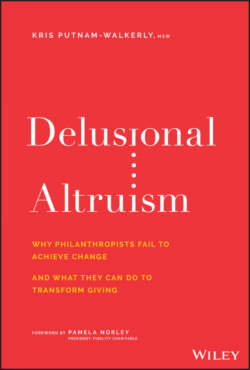Читать книгу Delusional Altruism - Kris Putnam-Walkerly - Страница 14
Believing You Don't Deserve Something
ОглавлениеToo often, philanthropists feel they don't deserve to [fill in the blank], such as invest in themselves, retain an executive coach, fund a needs assessment, attend a conference, improve their technology, hire top talent, spend time learning with other philanthropists, share their accomplishments publicly, learn how they can advocate for policy change, or fund an evaluation.
Why? Because they have a misguided belief that all their money should go to help others.
This is especially pervasive in family philanthropy, among those who have inherited wealth, and among entrepreneurs who have earned their own wealth. But it's true for most any philanthropist.
Mind you, they might simultaneously be spending $15,000 to graphically design, print, and mail hard copies of their annual report; budgeting $30,000 for new marble kitchen countertops for their third vacation home; spending $100,000 annually to mist the plants at corporate headquarters; or forking over half a million dollars annually on fuel for their private jets.
But when it comes to charitable giving, scarcity rules the roost!
This belief might appear noble. In reality, it is delusional. In order to have the greatest philanthropic impact, you need to be the greatest philanthropist you can be. This involves understanding yourself, understanding the issues and communities you want to help, and investing time and resources to build your philanthropic muscle and know-how.
To help others, you first need to help yourself.
